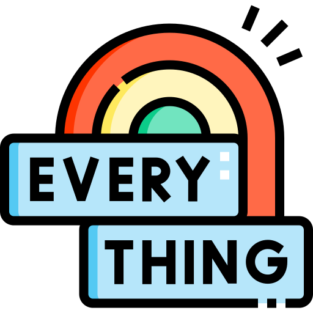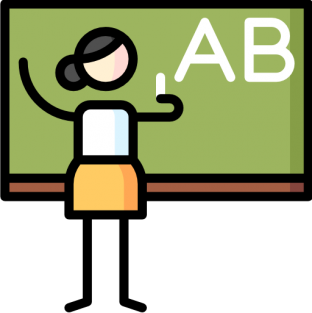In this post you will learn How to use verbs Ser and Estar (plus adjectives). To do so I invite you to watch an interview between a Brazilian actor, Paulo Gustavo, and the famous TV show host, Jô Soares, in the TV show called Programa do Jô.
Let’s begin with that as a listening exercise! Watch the video below. (In the end of this post, you can find the transcription of the video)
In the beginning of the interview, they use a lot the same structure to talk about how people are. To do that they use verb Estar followed by an adjective. Basically, you could translate this to the English structure: verb BE + ADJECTIVE.
1. But there is a very important difference! How to use verbs Ser and Estar.
Well, verb BE can be translated to TWO verbs in Portuguese = SER and ESTAR. Both can be used together with ADJECTIVES. But there is a difference of meaning. Learn now How to use verbs Ser and Estar (+ adjectives).
SER + ADJECTIVE → fixed or permanent condition or characteristic
Eu sou brasileira. (I’m Brazilian. → This is a permanent characteristic about myself, since this is my nationality.)
Eu sou feliz. (I’m happy. → Using verb SER here what I want to say is that I’m always happy, that I have a good life full of happiness).
Ana é bonita (Ana is beautiful) → Ana is really beautiful, maybe since she was born.
ESTAR + ADJECTIVE → transitory or temporary state or characteristic
Eu estou feliz. (I’m happy. → In this case, when using verb ESTAR, what I want to say is that I’m happy in that moment, about something that happened os that is happening.)
Eu estou triste. (I’m sad. → Here, I could say that I’m sad now but it will pass and I will become happy again. It’s a temporary situation).
Ana está bonita (Laura is beautiful) – In that moment Laura is beautiful, but maybe she doesn’t look beautiful all the time.
2. Let’s conjugate verb SER and ESTAR in the Present?
Verb SER (to be)
| Subject | Verb |
| Eu | SOU |
| Você / Ele / Ela / A gente | É |
| Nós | SOMOS |
| Vocês / Eles / Elas | SÃO |
Verb ESTAR (to be)
| Subject | Verb |
| Eu | ESTOU |
| Você / Ele / Ela / A gente | ESTÁ |
| Nós | ESTAMOS |
| Vocês / Eles / Elas | ESTÃO |
3. Tips of real uses of Brazilian Portuguese:
Estou → tô
In conversation, we usually shorten the verb “estar”.
Está → tá
Estão → tão
Examples:
Eu tô linda. (I’m beautiful)
Eu tô cansada. (I’m tired.)
Ele tá bravo. (He’s angry)
Ela tá animada. (She’s excited)
Eles tão apaixonados. (They’re in love)
4. Examples from the video:
Now that you understood the differences between verbs SER and ESTAR and you already know how to conjugate verb ESTAR, let’s check the sentences Jô Soares and Paulo Gustavo use in their conversation.
- Você é super gato, Jô!
- Num tá bem?
- Tá ótimo, super estiloso.
- Eu tô bem também?
- Você tá ótimo!
- O pai também é (careca).
- Ela não tá acostumada.
- A plateia hoje tá venenosa.
- Tá ótima!
- A plateia tá animada hoje.
5. Transcription of the video:
And here you have the transcription of the video. Now you must watch the video again and read the transcription to check your own understanding of it. Also check the translation if you don’t know a word or expression.
Watch the video as much as you want to be more and more familiar with the verbs and structures. Also don’t forget to add new words and expressions in your ANKI!
If you don’t know what ANKI is or if you don’t know how to use it, check this post here.
Transcription of the video:
Jô: Ele tá com uma nova peça em cartaz. Paulo Gustavo, venha pra cá.
…
Jô: Cê vai bem?
Paulo: Sabe o que eu tava pensando ali sentado? Cê é super gato, Jô. Com esse óculos vermelho, num tá bem? Tá ótimo. Superestiloso.
Jô: Brigado.
Paulo: Eu tô bem também?
Jô: Você tá ótimo!
Paulo: Porque a filha do Delico riu da minha cara lá embaixo.
Delico: Riu.
Paulo: Ela passou, eu fui falar…
Delico: Ela não riu…
Paulo: …oi e ela tomou um susto.
Delico: … ela ficou assustada. Tomou um susto.
Paulo: Eu falei: careca num é, porque o pai também é.
Delico: É porque ela não tá acostumada.
Paulo: Num tá acostumada?
Jô: Num é pra você responder o convidado…
Delico: Não.. não.. é que… desculpa.
Jô: É pra calar a boca e ouvir o que ele tem a dizer a respeito da sua filha que foi mal-educada com o convidado…
Delico: Não, num foi…
Jô: Foi grosseira.
Delico: Não, não.
Jô: Eu já falei pra deixar ela trancada na jaula em vez de trazer.
Paulo: Eu cheguei aqui hoje, a menina que trabalha aqui falou assim pra mim: “Já tá com a roupa que vai dá a entrevista?”. Eu falei: Por que tá com algum problema?
Jô: Eu achei ótima.
Paulo: Cê achou, né? Então tá. Vim combinando.
Jô: A minha também, né? Eu pego a primeira roupa que eu vejo e ponho.
Paulo: Eu queria usar óculos, sabia? Eu acho que fica bem a pessoa de óculos. Assim, dá um ar meio intelectual…
Jô: Meio de óculos…
Paulo: Meio de óculos…
JÔ: Mas usa. Qual é o problema?
Paulo: É, sem lente. Eu não tenho grau né?
Jô: Põe uma lente sem grau.
Paulo: É, vou fazer isso. Saudade de você, Jô.
Jô: Eu também. Plateia hoje tá venenosa.
Paulo: Tá ótima.
Jô: Você tá com Hiperativo, é o nome do espetáculo?
Paulo: Hiperativo. É, é um standup. Eu reuni várias histórias agora. Plateia tá animada hoje, né?
Jô: Nossa mãe!
Paulo: Tá ótima!
Jo: He’s got a new play on. Paulo Gustavo, come here.
…
Jo: Are you ok?
Paul: Do you know what I was thinking sitting there? You’re a super hot, Jô. With these red glasses, isn’t that good? It’s great. Super stylish.
Jo: Thank you.
Paul: I’m fine too?
Jo: You look great!
Paulo: Because Delico’s daughter laughed at me downstairs.
Delico: Laughs.
Paulo: She passed, I went to say…
Delico: She didn’t laugh…
Paulo: … hi and she was scared.
Delico:… she got scared. It took a fright.
Paul: I said: bald is not, because so is his father.
Delico: It’s because she’s not used to it.
Paulo: Aren’t you used to it?
Jo: It’s not for you to answer the guest …
Delico: No .. no .. it’s that… sorry.
Jo: It’s to shut up and hear what he has to say about his daughter who was rude to the guest …
Delico: No, it wasn’t…
Jo: It was rude.
Delico: No, no.
Jo: I told you to lock her in the cage instead of bringing her here.
Paulo: I arrived here today, the girl who works here said to me: “Do you have the clothes that will give the interview?”. I said: Why? Is there any problem?
Jo: I thought it was great.
Paulo: You think so, right? So it is. I came to match.
Jo: Mine too, right? I take the first outfit I see and put it on.
Paulo: I wanted to wear glasses, you know that? I think the person with the glasses looks good. So it gives a kind of intellectual air…
Jo: Like wearing glasses …
Paulo: Like wearing glasses…
JÔ: But it does. What is the problem?
Paul: Yeah, no lens. I have no degree right?
Jo: Put on a lens without a degree.
Paul: Yeah, I’ll do it. Miss you, Jô.
Jo: Me too. Audience today is poisonous.
Paulo: It is great!
Jo: Are you with Hyperactive, is the name of the show?
Paul: Hyperactive. Yeah, it’s a standup. I have gathered several stories now. Audience is excited today, right?
Jo: Holy mother!
Paulo: It’s great!
We had a class about this topic. It was a live class on Youtube, and it is here just for you!
Enjoy!
Hey,
o que você achou deste conteúdo? Conte nos comentários.















[…] verboser verbser vocabularioportugues weather Artigos Relacionados Grammar […]